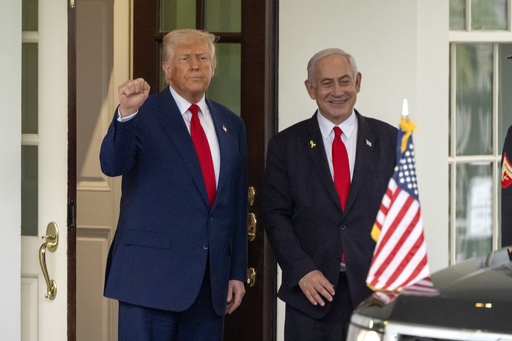
FILE - President Donald Trump, left, stands with Israel's Prime Minister Benjamin Netanyahu at the West Wing of the White House, April 7, 2025, in Washington. (AP Photo/Mark Schiefelbein, File)
Every Philosophy 101 student is familiar with the classic moral dilemma: if given the opportunity to eliminate Adolf Hitler before his rise to power, would you do it? This hypothetical question challenges individuals to weigh the potential prevention of immense suffering against the moral implications of taking a life. Today, a similar dilemma unfolds on the global stage, with Iran’s nuclear ambitions at the center of the debate.
For weeks, discussions have intensified across social media platforms, news outlets, and political circles about whether the United States should support Israel in military action to neutralize Iran’s nuclear threat. While opinions vary, the consensus remains that allowing Iran’s leaders, who have openly expressed hostility toward the West, to possess nuclear weapons is a perilous prospect.
The Historical Context of Preemptive Action
The debate over preemptive military action is not new. Historically, nations have grappled with the moral and strategic implications of striking first to prevent greater harm. The Cuban Missile Crisis of 1962 is a notable example, where the U.S. faced the decision of whether to engage in military action to remove Soviet missiles from Cuba, ultimately opting for a naval blockade and negotiation.
Similarly, the 2003 invasion of Iraq was justified by the U.S. government as a preemptive measure to eliminate weapons of mass destruction, though such weapons were never found. These historical precedents highlight the complexity and potential consequences of preemptive strikes.
Current Perspectives on the Iranian Threat
Today, the Iranian nuclear issue presents a comparable moral and strategic challenge. Critics of military intervention argue that it could lead to a prolonged conflict in the Middle East, destabilizing the region further. However, proponents contend that allowing Iran to develop nuclear capabilities poses a direct threat to global security.
Former President Donald Trump, known for his “America First” policy, has consistently opposed Iran’s nuclear ambitions. His administration’s stance was clear: Iran must not obtain nuclear weapons. This position aligns with the broader goal of maintaining U.S. influence and security in the region.
Expert Opinions and Political Reactions
Experts remain divided on the best course of action. Some, like former National Security Advisor John Bolton, advocate for decisive military action, arguing that diplomacy has failed to curb Iran’s nuclear ambitions. Others, including former Secretary of State John Kerry, emphasize the importance of diplomatic engagement and multilateral agreements, such as the Iran nuclear deal, to ensure compliance and stability.
Political reactions have been equally varied. While some Republicans support Trump’s hardline stance, others, including prominent figures like Tucker Carlson, express concern over potential manipulation by foreign interests or the risk of entangling the U.S. in another “forever war.”
The Implications of Inaction
As the debate continues, the implications of inaction loom large. Allowing Iran to develop nuclear weapons could trigger a regional arms race, with neighboring countries seeking their own nuclear capabilities in response. This scenario risks escalating tensions and increasing the likelihood of nuclear conflict.
Moreover, the potential for nuclear weapons to fall into the hands of terrorist organizations poses an additional threat to global security. The stakes are high, and the consequences of inaction could be dire.
Looking Forward: Navigating the Moral Landscape
As the world watches, the U.S. and its allies must navigate this complex moral landscape carefully. The decision to engage in military action or pursue diplomatic solutions will have far-reaching implications for international relations and global security.
Ultimately, the Iranian nuclear dilemma underscores the enduring challenge of balancing moral considerations with strategic interests. As history has shown, the path forward is fraught with uncertainty, but the need for decisive and thoughtful action has never been more critical.
In the words of Frank Miele, retired editor of the Daily Inter Lake, “It’s not a philosophy quiz this time; it’s real life.” The choices made today will shape the world of tomorrow, and every patriotic American should be rooting for a resolution that ensures peace and security for future generations.






